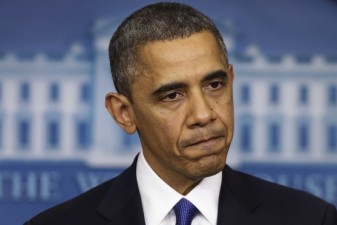
24/04/2015 10:28
Obama again bows to Turkish pressure in his April 24 statement
President Barack Obama issued his annual statement on the Armenian Genocide, and as it was announced earlier this week, he failed to use the word Genocide to describe the systematic killing and deportation of Armenians during the Ottoman Empire, instead choosing, once again, to bow to Turkish pressure, Asbarez reports.
“The sad spectacle of President Obama playing word games with genocide, so obviously dodging the truth at the direction of a foreign power, falls beneath the dignity of the American people,” said Aram Hamparian, Executive Director of the Armenian National Committee of America.
“Candidate Obama was right when he said that ‘America deserves a leader who speaks truthfully about the Armenian Genocide and responds forcefully to all genocides.’ He has, regretfully, proven to the world today that he is not that president. In fact, it’s now clear that President Obama’s misguided attempt to appease Ankara has only isolated Washington,” he added.
The full text of the White House Statement is provided below.
Statement by the President on Armenian Remembrance Day
This year we mark the centennial of the Meds Yeghern, the first mass atrocity of the 20th Century. Beginning in 1915, the Armenian people of the Ottoman Empire were deported, massacred, and marched to their deaths. Their culture and heritage in their ancient homeland were erased. Amid horrific violence that saw suffering on all sides, one and a half million Armenians perished.
As the horrors of 1915 unfolded, U.S. Ambassador Henry Morgenthau, Sr. sounded the alarm inside the U.S. government and confronted Ottoman leaders. Because of efforts like his, the truth of the Meds Yeghern emerged and came to influence the later work of human rights champions like Raphael Lemkin, who helped bring about the first United Nations human rights treaty.
Against this backdrop of terrible carnage, the American and Armenian peoples came together in a bond of common humanity. Ordinary American citizens raised millions of dollars to support suffering Armenian children, and the U.S. Congress chartered the Near East Relief organization, a pioneer in the field of international humanitarian relief. Thousands of Armenian refugees began new lives in the United States, where they formed a strong and vibrant community and became pillars of American society. Rising to great distinction as businesspeople, doctors, scholars, artists, and athletes, they made immeasurable contributions to their new home.
This centennial is a solemn moment. It calls on us to reflect on the importance of historical remembrance, and the difficult but necessary work of reckoning with the past. I have consistently stated my own view of what occurred in 1915, and my view has not changed. A full, frank, and just acknowledgement of the facts is in all our interests. Peoples and nations grow stronger, and build a foundation for a more just and tolerant future, by acknowledging and reckoning with painful elements of the past. We welcome the expression of views by Pope Francis, Turkish and Armenian historians, and the many others who have sought to shed light on this dark chapter of history.
On this solemn centennial, we stand with the Armenian people in remembering that which was lost. We pledge that those who suffered will not be forgotten. And we commit ourselves to learn from this painful legacy, so that future generations may not repeat it.








